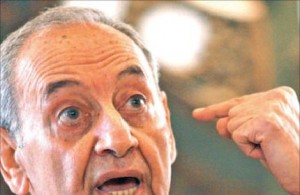 Lebanese Speaker Nabih Berri said during an interview with An-Nahar newspaper which was published on Saturday that the upcoming 2013 parliamentary elections will not take place before a new consensus is reached on an electoral law .
Lebanese Speaker Nabih Berri said during an interview with An-Nahar newspaper which was published on Saturday that the upcoming 2013 parliamentary elections will not take place before a new consensus is reached on an electoral law .
He added that all the proposed electoral draft laws will be examined before political factions reach a deal on the most suitable one for the upcoming elections.
On Thursday, the joint parliamentary committees formed an electoral subcommittee to study the disputed issues concerning the electoral draft laws referred to the parliament .The committee is expected to hold its first meeting on Tuesday under the chairmanship of Deputy Speaker Farid Makari.
MPs from the joint parliamentary committees have failed in five sessions to bridge the deep differences between the March 14 and the Hezbollah-led March 8 over which legislation best guarantees fair representation for all the parties in the 2013 elections.
The committees are discussing three proposals:
The cabinet’s draft electoral law which was approved earlier in August and which divides Lebanon into 13 medium-sized districts based on a system of proportional representation.
The March 14 proposal that would divide Lebanon into 50 small districts under a winner-takes-all-system
The so called Orthodox Gathering proposal which was forwarded by Aoun’s Change and Reform parliamentary bloc, which calls on each sect in Lebanon to vote only for its candidate in the elections based on proportional representation and one electoral district for the whole country .
Commenting on the proposal submitted by the March 14 Christian MPs and which calls for the 50 electoral districts Berri said that the law submitted by the government guarantees to the christian community a greater number of deputies elected on the votes of Christians.”
Progressive Socialist party leader MP Walid Jumblatt favors the current 1960 electoral law as modified in Doha Qatar in 2008 and which calls for 26 districts and winner take all majority, but the Maronite bishops council rejected in September the 1960 electoral law because “it does not ensure fair representation.” They also oppose any amendment to the 1960 law, “because it resulted in representation that violates coexistence.”
Cabinet
Asked about the current cabinet of PM Najib Mikati, the speaker said: “ This government is needed. When some groups said that a new cabinet will be established to oversee the elections I replied saying that the present government will continue even after the elections and I hereby reiterate what I had said .”
Syrian uprising
Commenting on the fighting in violence-stricken Syria, Berri predicted that the Syrian crisis will be with us for a long time , while at the same time he voiced his hope that “the bloody confrontations there will stop as soon as possible.”
Speaker Berri, who heads up the Amal Movement is a key member of the Iranian and Syrian- backed Hezbollah-led March 8 alliance. There is concern within the March 14 opposition that Hezbollah is no hurry for the elections as long as the crisis in Syria continues.

Leave a Reply
You must be logged in to post a comment.